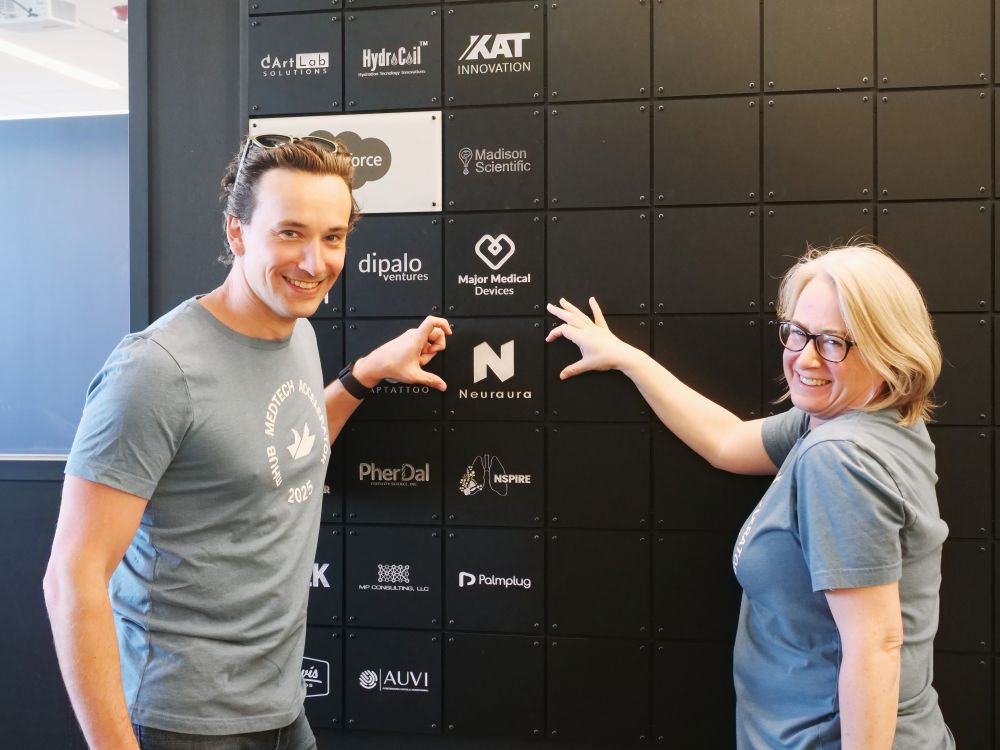Claire Dixon is the CEO and co-founder of Neuraura. Neuraura is a Calgary-based biotech company focused on developing neuromodulation devices to reduce the burden of disease of chronic, underserved conditions. Their core technology revolves around advanced micro-electrodes that enhance neural recording and stimulation for diagnostics and therapy. Their first application is LoOoP, a bioelectronic platform for polycystic ovary syndrome (PCOS).

What is your business called and what does it do?
My business is called Neuraura Biotech Inc. (Neuraura), we are developing LoOoP, a bioelectronic platform for the relief of PCOS (polycystic ovary syndrome).
PCOS is the most common hormonal condition, affecting almost 1 in 5 women; it is the leading cause of female infertility and is a significant risk factor in almost all of the major health-related killers of women.
LoOoP combines a neuromodulation device to alleviate the symptoms of PCOS with a digital platform to help close the broader gaps in information, diagnosis and care.
What made you want to do this work?
In 2022, faced with the decision to pivot our strategic direction away from our original focus in invasive neurotech, we undertook a structured review of unmet clinical needs that could be addressed through neuromodulation solutions.
When one of our interns taught us about PCOS, our team was shocked and angry that a condition so common and profound could be so overlooked. From a personal perspective, I had experienced almost a decade of infertility and recurrent pregnancy loss and not one of my doctors had mentioned PCOS to me.
What problem did you want to solve with the business?
There are many unmet clinical needs in women’s health. We are starting with PCOS as it is the eye of the storm in hormonal, metabolic, reproductive and maternal health.
The standard of care, often without formal diagnosis, is to prescribe hormonal contraceptives. Whilst these can be effective for some specific symptoms such as acne or excess bleeding, these mask the underlying condition, inherently disrupt fertility further, and many women gain additional weight when on the pill.
The diagnostic criteria for PCOS were updated in 2023, but have not yet percolated through the clinical system. As a result, more than 70% of individuals go undiagnosed.
As a multi-system disorder, individuals with the condition are often not well-served by a clinical system of specialties. The opportunity for screening and/or preventative care to avoid, delay or reduce long-term health complications such as diabetes, cardiovascular disease and dementia is therefore lost.
Who are your main clientele/demographics?
We aim to serve all individuals who are diagnosed with or suspect they have PCOS. Speaking to our target customers, we learnt that many digital solutions in women’s health begin with the paradigm of a regular menstrual cycle and that forms the backbone of “personalized” advice.
This inherently excludes those who don’t menstruate due to life-stage or other reasons; with irregular or absent periods as a core feature of PCOS, we decided this approach was inherently flawed. Thus, we aim to serve individuals at all stages of life, not just in the “reproductive years”.
How does your business make money?
Our business model starts with a subscription to the digital platform. In addition to direct sales to end-users, we are seeking pilots with corporate partners, pharma companies, large employers and women’s clinics, as part of our goal is to catalyze women to make more effective use of the current system of care.
We plan to launch our MVP device next year and will sell that device either as a single hardware sale or via a subscription model.
This is a very exciting time for our business as we are doing our soft launch of the digital platform this September and are recruiting for our first 1,000 users who will help us continue to build our solution’s capabilities.
Where in the city are you located?
We originally spun out of the University of Calgary in 2017 and were formed as part of the inaugural cohort of the Creative Destruction Lab Rockies program. Since COVID, our team has been fully remote; my co-founder now lives in BC, and we work with talented teams and key suppliers around the world.
What is the best question a prospective customer could ask a member of your profession when comparing services?
For me, this comes down to empathy, i.e., how do you know that I will get value from your device? In addition to drawing on my personal experience, I’ve spoken with hundreds of women (and their nearest and dearest) about their experiences with PCOS. Early on, we established an end-user advisory board to guide our positioning and product development.
What is the best part about what you do? What is the worst part?
In the startup world, they talk a lot about product-market fit. I believe that what comes before that is the founder problem fit. I have such a personal passion for the problem we are solving that it doesn’t feel like work even when it gets tough.
The worst part of working in women’s health is that it gives you a “peek behind the curtain”, you see the systematic structural problems that lead to the health equity gap that you just can’t unsee. It’s incredibly troubling that we are still dealing with issues such as shadow-banning of women’s health content.
Where can we follow you?
Website | LoOoP | LinkedIn | Instagram
PAY IT FORWARD: What is another local business that you love?
Nimble Science




